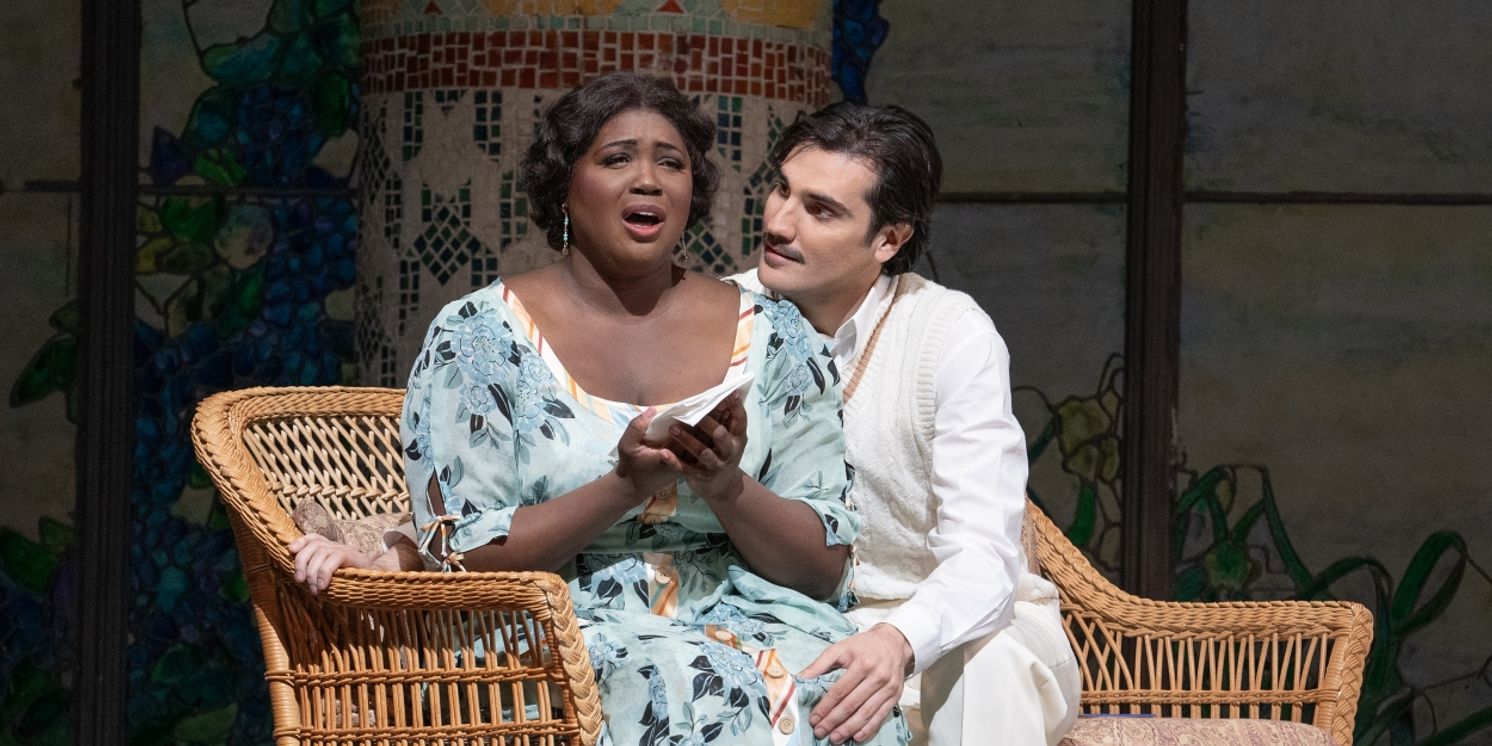Review: Fine Singing Makes RONDINE Easy to Swallow under Scappucci
Glamorous Production with Blue, Tetelman, Davronov, Pogorelc Helps Put Across a Minor Puccini

The first night of the Met’s revival of Puccini’s LA RONDINE (THE SWALLOW) was filled with surprises of one sort or another, under the baton of that smart conductor, Speranza Scapucci, who knows her way around Puccini and deserves to be heard more frequently at the house. The production had glamour through Art Deco-ish scenic design by Ezio Frigerio, with lighting by Duana Schuler and costumes by Franca Squarciapino.
First, the name above the title: Soprano Angel Blue. She’s one of those singers whose voice seems to get bigger every time you hear it, though the Met still insists on casting her frequently as the ingenue, eg, Micaela and Liu. (She does, however, have an Aida ahead.) Here, she had a good night as Magda, a role that fit her voice quite well, suave and lovely. Certainly, she was much better here than in her role debut as Violetta in TRAVIATA, who is kind of a step-sister to Magda, with acting that made sense and sophisticated as she needed to be.
She shares the work’s most famous aria, “Il sogno di Doretta,” with the light, sweet tenor of Bekhzod Davronov, who made a fine impression as Prunier from his first appearance in Act I; he also paired wonderfully with another of the evening’s delightful debutantes, soprano Emily Pogorelc as Lisette, an Adele-ish (FLEDERMAUS) type of maid for Magda, who had great fun with her role, showing off her pretty soprano. Bass-baritone Alfred Walker did fine work in the smaller role of Rambaldo, the banker who is Magda's sugar-daddy.
Puccini knew a good tune when he heard one and, with what seemed like a shortage of musical inspiration in RONDINE, “Doretta” turned up a couple of times. He did come up with at least one other good aria that permitted the tenor to show off; here, it was Jonathan Tetelman, making his house debut, as Ruggero, the young man who arrives in Paris and becomes smitten with Magda. His gorgeous third act music, “Dimmi che vuoi seguirmi,” soared beautifully and he fared extremely well in his pairings with soprano Blue.
He also cut a fine figure as the romantic lead, which doesn’t hurt in these days of HD broadcasts; RONDINE (with the current cast) will be aired worldwide on April 20 and Tetelman will be heard again in MADAMA BUTTERFLY (with soprano Asmik Grigorian) on May 11. His performance made me curious to hear him again when he takes on Pinkerton, an edgier, more melodic role. In RONDINE, he also showed that knows how to use his voice to the fill out the corners of a character that the varied librettists who worked on the piece seemed to have forgotten.
One of the lesser surprises of the evening: How derivative the opera is, stealing not only from Puccini’s own LA BOHEME (without the starving artists) but, more blatantly (and not so well), from Verdi’s LA TRAVIATA. The second act of the piece takes place at Bullier’s dance hall, which is a pale reflection of the Café Momus scene in BOHEME, though it is designed quite well in the style of the famous Parisian cafes in Montparnasse. (I heard some griping in the audience about the somewhat violent Apache dance in the scene and noticed that no one is credited with the choreography.)
Puccini purportedly called the opera (or commedia lirica) “a real disaster” to his librettist, Giuseppe Adami; that doesn’t seem a reflection of what we heard at the Met the other night. Perhaps not a BOHEME or TOSCA, but certainly not a catastrophe, though the ending seemed somewhat abrupt. Nonetheless, Puccini and his librettists took it through many revisions and there isn’t a definitive performing version. In fact, a return to their first try is reflected in the performance that will debut at La Scala next week.
Puccini’s LA RONDINE will be performed at the Met through the matinee on April 20 with the same cast. For more information and tickets, see the Met’s website.
Caption: Angel Blue and Jonathan Tetelman in LA RONDINE
Photo: Karen Almond/Met Opera
Reader Reviews
Videos

